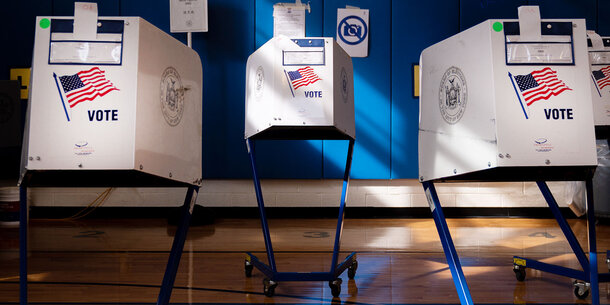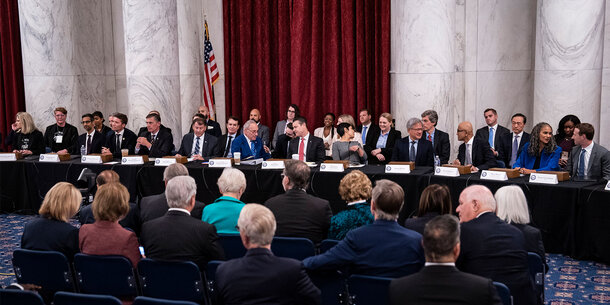Georgia’s Proposed Voting Restrictions Will Harm Black Voters Most
State legislators are pushing regressive bills to end no-excuse mail voting for younger voters and to eliminate early in-person voting on Sundays.

In November 2020, President Joe Biden won the state of Georgia by a narrow margin, edging out Donald Trump by fewer than 13,000 votes. While the margin was small, it was the first time a Democratic presidential candidate had won the state since Bill Clinton did in 1992. Two months later, the two Democratic candidates for U.S. senator both won their elections in the Peach State, the first time a Democratic senator had been elected since 1996. footnote1_31if471 1 Zell Miller, a Democrat, was appointed to finish the late Paul Coverdell’s term in 2000, but Miller was never elected to the Senate.
We have seen a rush of anti-voter bills introduced in the wake of the 2020 presidential election all around the country. Georgia Republicans have introduced regressive legislation that would eliminate automatic voter registration in the state (a policy that has boosted registrations enormously) and are seeking to make voting by mail far more difficult. Given the dynamics of the 2020 election, the restrictions to voting by mail seem especially likely to hurt Black voters, who used mail ballots at far higher rates last year than ever before.
As we wrote last year, there was little evidence before 2020 that Democratic-leaning constituencies used vote-by-mail at higher rates than other voters. These patterns continued through Georgia’s June 2020 primary, when 54 percent of white voters cast a ballot by mail, compared with just 44 percent of Black voters. footnote2_uwkhgr6 2 Younger and nonwhite voters – voters less likely to support Republican candidates, in other words – have also historically had higher mail ballot rejection rates.
This all changed in the 2020 general election.
Racial Composition of Vote-by-Mail Electorate in Georgia footnote3_9k3uyzb 3 All our figures are calculated by merging the voter history files made publicly available with a snapshot of the registered voter file from November 2, 2020.
Following the intense politicization of mail voting by then-President Trump, the partisan composition of the vote-by-mail electorate shifted drastically. Although vote-by-mail usage exploded for all racial groups, it increased less for white voters than for others. Although white voters still made up a majority of mail voters, their share of the vote-by-mail electorate dropped from 67 percent in 2016 to 54 percent in 2020; the Black share, meanwhile, surged from 23 percent to 31 percent. As the figure below shows, footnote4_fbjsrhy 4 Approximately 0.3 percent ballots were cast electronically by unformed and overseas voters; we exclude them to make the figure easier to read. Their exclusion does not alter our conclusions. nearly 30 percent of Black voters cast their ballot by mail in 2020, but just 24 percent of white voters did so.
The Racial Composition Is Different for Older Voters
There are currently multiple live bills in the Georgia Legislature that would end no-excuse mail voting. These bills, however, include carve outs for older voters. Senate Bill 241 — which advanced out of the Senate Ethics Committee this week — includes being 65 or older as a valid excuse; Senate Bill 71, which has also seen movement in the Senate this week, would make being 75 or older a valid excuse.
In other words, under these proposals, older voters — who according to CNN exit polls supported Republicans at higher rates in 2020 — would continue to have unrestricted access to vote-by-mail. As the figure below shows, fewer than half of vote-by-mail participants under 65 years old were white, but 60 percent of the mail voters between 65 and 74, and 70 percent of the mail voters 75 and older were white. Because older Georgians are whiter than younger Georgians, the legislation restricting mail voting for younger voters disproportionately benefits white voters.
Ending Sunday Voting Further Harms Black Voters
Curtailing mail voting isn’t the only regressive change being considered by Georgia Republicans. House Bill 531 — which passed in the Georgia House on Monday — contains many restrictive provisions, such as shrinking the absentee ballot application window and limiting the hours during which mail ballot drop boxes can be open. It also eliminates early in-person voting on Sundays in the weeks leading up to an election.
Sundays have historically been important turnout days for Black Americans, as Black churches organize “Souls to the Polls” drives. To understand the racial implications of this proposed change, we looked at who voted early on what days in the 2020 general election.
Although Sunday was not a particularly popular day for voting in 2020 (just 2.7 percent of early in-person ballots were cast on a Sunday), there are clear racial divisions. Black voters (who make up 30 percent of the registered electorate) accounted for 36.5 percent of Sunday voters, but just 26.8 percent of early in-person voters on other days. On the other hand, 60 percent of the voters who voted early on other days were white, though that was true of just 47 percent of Sunday voters (53 percent of registered voters in Georgia are white). Barring counties from holding early in-person voting on Sundays would disproportionately impact Black Georgians.
Conclusion
Around the country, we are seeing legislators push to make voting harder. In the case of Georgia, these changes will disproportionately hurt Black voters. The state is considering restricting mail voting in response to a shift in the racial demographics of the voters who use it, but wants to keep mail voting available for older, whiter mail voters. The same is true for early in-person voting: Republicans in the Peach State want to end Sunday voting, a day disproportionately popular among Black voters. Voter suppression is always unacceptable, and the razor thin political margins in Georgia may mean that suppression efforts like these will change political outcomes. Rather than imposing barriers, Georgia should be looking at ways to improve voter access.
End Notes
-
footnote1_31if471
1
Zell Miller, a Democrat, was appointed to finish the late Paul Coverdell’s term in 2000, but Miller was never elected to the Senate. -
footnote2_uwkhgr6
2
Younger and nonwhite voters – voters less likely to support Republican candidates, in other words – have also historically had higher mail ballot rejection rates. -
footnote3_9k3uyzb
3
All our figures are calculated by merging the voter history files made publicly available with a snapshot of the registered voter file from November 2, 2020. -
footnote4_fbjsrhy
4
Approximately 0.3 percent ballots were cast electronically by unformed and overseas voters; we exclude them to make the figure easier to read. Their exclusion does not alter our conclusions.





